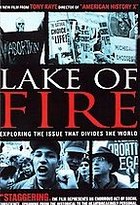Regie:
Tony KayeDrehbuch:
Tony KayeKamera:
Tony KayeBesetzung:
Noam Chomsky, Alan Morton Dershowitz, Peter Singer, Sarah Weddington, Nat Hentoff, Roger Mahony, Pat BuchananInhalte(1)
Filmmaker Tony Kaye, best known for "American History X," has been working on LAKE OF FIRE for the past fifteen years and has made a film that is unquestionably the definitive work on the subject of abortion. Shot in luminous black and white, which is in fact an endless palette of grays, the film has the perfect aesthetic for a subject where there can be no absolutes, no 'right' or 'wrong.' He gives equal time to both sides, covering arguments from either extremes of the spectrum, as well as those at the center, who acknowledge that, in the end, everyone is 'right' - or 'wrong.' (Verleiher-Text)
(mehr)Kritiken (1)
Though two and a half hours may seem excessive, Lake of Fire never starts to become boring, which is due to the abundance of exotics, freaks, racists, homophobes and bigoted “pro-life” Catholics who preach about how homosexuals roast new-borns on a spit. For the same reason, despite the effort to constantly shift perspectives rather than offer a serious treatise on a serious subject, the film is reminiscent of a hysterical freakshow without a concept (which is not very surprising in the case of a film from a director with no previous filmmaking experience), a mashup of best-of moments from the television news, where those who cry the loudest generally end up. What matters is not whether the given person’s opinion makes any sense and offers something new opinion, but whether it is sufficiently extreme and offensive. This also corresponds to the lack of interest in the deeper motivation for the given belief system. We predominately hear shouts ripped from their context (though it is clear that many of the film’s subjects would give the impression of being psychopaths regardless of how much additional information we may have about them). Only a few older white men, who may have several academic degrees, calmly present their arguments, but – pardon my language - they don’t know shit about what a woman goes through before having an abortion (it is remarkable, though not very surprising, that the “pro-life” group is composed predominantly of men who are most likely terrified by the fact that a woman could freely decide on existence or non-existence). Tony Kaye attempts to make his film as attractive, or rather as shocking as possible, so you sometimes wonder whether you are watching an advertisement, video clip or exploitation horror film, which is also supported by the choice of the “artistic” black-and-white format, which distances us from reality rather than bringing us closer to it (e.g. the sight of blood is more disturbing when you see it in colour). The most substantial element is his epic, though certainly not “definitive” treatise on the ideological war around abortion in the calmest and seemingly most mundane moments when, following the model of the Verist school, he quietly captures rather ordinary dialogue through which the film finally brings forth something significant (the physician’s conversation with Stacey). Regardless of the many reservations we may have with respect to his approach, which gives preference to strong emotions over reasonable discussion, this sixteen-year-old film is a respectable work and is again particularly relevant in today’s climate, when whinging white men with a narrow range of knowledge and low intellect claim to be the masters of the world. 70%
()
Galerie (38)
Photo © Wild Side

